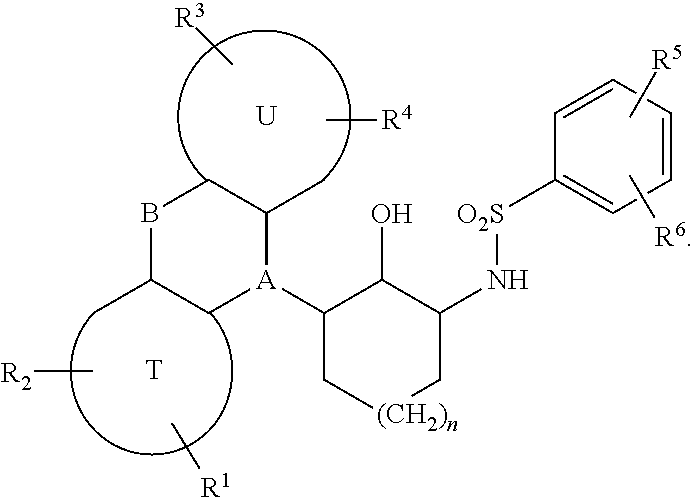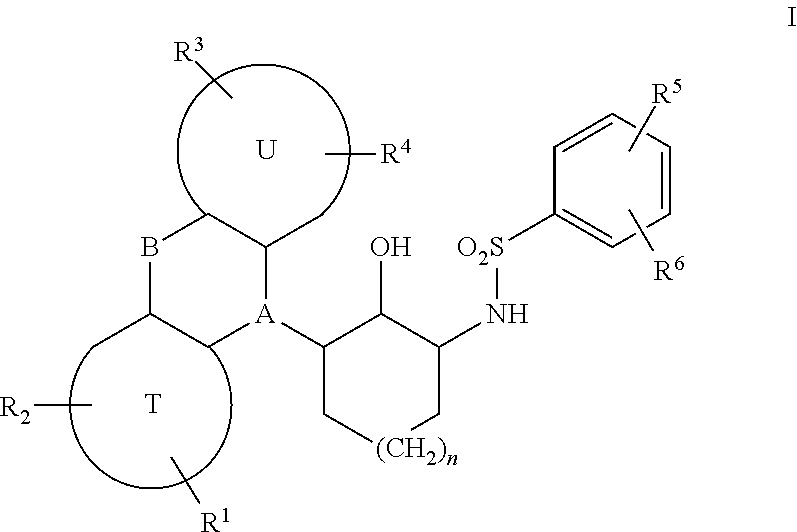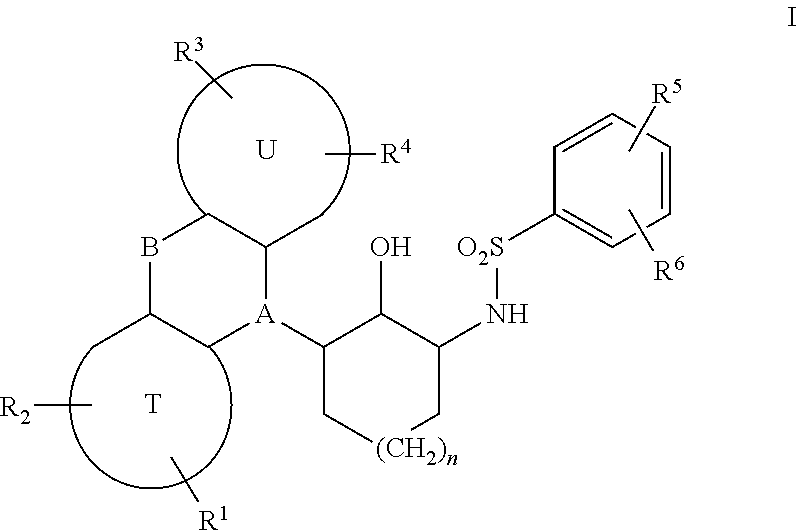Sulfonamides derived from tricyclyl-2-aminocycloalkanols as anticancer agents
a technology of aminocycloalkanols and sulfonamides, which is applied in the direction of drug compositions, immunological disorders, metabolism disorders, etc., can solve the problems of tumors ultimately developing resistance, none of the curative options, and metastatic prostate cancer inevitably progressing, so as to restore sensitivity to chemotherapy
- Summary
- Abstract
- Description
- Claims
- Application Information
AI Technical Summary
Problems solved by technology
Method used
Image
Examples
example 1
oxy-3-(10H-phenoxazin-10-yl)cyclohexyl)-4-(trifluoromethoxy)benzenesulfonamide
[0189]The reaction was done on 15.0 g of 2-amino-6-(10H-phenoxazin-10-yl)cyclohexanol (3 reactions of 5.00 g each).
[0190]Typical Procedure:
[0191]A solution of 2-amino-6-(10H-phenoxazin-10-yl)cyclohexanol (5.00 g, 16.9 mmol) in DCM (55.0 mL), and DMF (11.0 mL) was cooled to 0° C., treated with Et3N (9.42 mL, 67.6 mmol), and 4-(trifluoromethoxy)benzene-1-sulfonyl chloride (3.00 mL, 17.7 mmol). The mixture was warmed to RT, and stirred for 24 h.
[0192]The above three reactions were partitioned between water and CH2Cl2. The organic layer was washed with saturated aqueous NaCl (100 mL×5) to remove DMF, and concentrated in vacuo. The residue was dissolved in dichloromethane, silica was added, and solvent was removed in vacuo to make a dry plug. Purification was done in multiple batches by flash chromatography (SiO2, 0%-20% ethylacetate-hexanes) to afford white solid, which was triturated with 9:1 ether-hexanes, f...
example 2
[0220]
[0221]The synthesis begins with alkylation of commercially available 5,11-dihydrodibenzo[b,e][1,4]oxazepine with commercially available 3-bromocyclohex-1-ene to afford 5-(cyclohex-2-en-1-yl)-5,11-dihydrodibenzo[b,e][1,4]oxazepine in 83% yield. An osmium tetroxide catalyzed dihydroxylation of the alkene afforded diol in 40% yield. Treatment of diol with methanesulfonyl choride furnished mesylate in 10% yield. A sodium azide induced azide displacement of the mesylate afforded regioisomeric azides: the 2-azido-6-tricyclylcyclohexanol in 29% yield and the 2-azido-3-tricyclylcyclohexanol in 17% yield. The 2-amino-6-tricyclylcyclohexanol was synthesized from the 2-azido-6-tricyclylcyclohexanol via a Staudinger reaction in 80% yield. Treating 2-amino-6-tricyclylcyclohexanol with commercially available 4-(trifluoromethoxy)benzene-1-sulfonyl chloride afforded target sulfonamide Example 2 in a yield of 53%.
[0222]5-(cyclohex-2-en-1-yl)-5,11-dihydrodibenzo[b,e][1,4]oxazepine. To a solutio...
examples 3 , 4 , 5 , 6 and 7
Examples 3, 4, 5, 6 and 7
[0228]
R5=OCF3 (Ex. 3), R5=Cl (Ex. 4), R5=CN (Ex. 5), R5=OCH3 (Ex. 6), R5=H (Ex. 7).
[0229]First route to racemic Example 3:
[0230]9-(cyclohex-2-en-1-yl)-9H-carbazole. A solution of carbazole (4.00 g, 23.9 mmol) in DMF (40 mL) was cooled to 0° C., treated with NaH (60% dispersion in mineral oil, 1.00 g, 25.1, mmol), stirred for 0.5 h, then treated with 3-bromo-cyclohex-1-ene (3.03 mL, 26.3 mmol). The mixture was warmed to 25° C., and stirred for 14 h. The mixture was partitioned between saturated aqueous NaCl (100 mL), and CH2Cl2 (300 mL). The organic layer was washed with saturated aqueous NaCl (3×100 mL), dried (Na2SO4), and concentrated in vacuo. The residue was dissolved in a minimal amount of CH2Cl2 and purified by flash chromatography (SiO2, 100% hexanes). The purified fractions were combined, dissolved in a minimal amount of methanol and stirred until a white solid precipitated affording the title compound as a white solid (5.41 g, 91%). 1H NMR (600 MHz,...
PUM
| Property | Measurement | Unit |
|---|---|---|
| length | aaaaa | aaaaa |
| diameter×150 | aaaaa | aaaaa |
| time | aaaaa | aaaaa |
Abstract
Description
Claims
Application Information
 Login to View More
Login to View More - R&D
- Intellectual Property
- Life Sciences
- Materials
- Tech Scout
- Unparalleled Data Quality
- Higher Quality Content
- 60% Fewer Hallucinations
Browse by: Latest US Patents, China's latest patents, Technical Efficacy Thesaurus, Application Domain, Technology Topic, Popular Technical Reports.
© 2025 PatSnap. All rights reserved.Legal|Privacy policy|Modern Slavery Act Transparency Statement|Sitemap|About US| Contact US: help@patsnap.com



